I want to calculate the average time duration of my events. After an event starts and ends, it sends a request to my InfluxDB in the Line Protocol Syntax:
mes1 id=1,event="start" 1655885442
mes1 id=1,event="end" 1655885519
mes1 id=2,event="start" 1655885643
mes1 id=2,event="end" 1655885914
mes1 id=3,event="start" 1655886288
mes1 id=3,event="end" 1655886372
mes1 id=4,event="start" 1655889323
mes1 id=4,event="end" 1655889490
I can query the results like this:
from(bucket: "buck1")
|> range(start: -1w)
|> filter(fn: (r) => r["_measurement"] == "mes1")
|> filter(fn: (r) => r["_field"] == "event")
|> elapsed()
As you can see, I also get the durations between those events, not only of the events themselves.
Consequently, when I add the mean() function, I get the mean of ALL elapsed seconds:
from(bucket: "buck1")
|> range(start: -1w)
|> filter(fn: (r) => r["_measurement"] == "mes1")
|> filter(fn: (r) => r["_field"] == "event")
|> elapsed()
|> mean(column: "elapsed")
How Can I get the average of only the events, not the time between them?
The durations of those events are:
- 77 sec
- 271 sec
- 84 sec
- 167 sec
So the expected result is 599/4 = 149.75 seconds.
Update:
from(bucket: "buck1")
|> range(start: -1w)
|> filter(fn: (r) => r["_measurement"] == "mes1")
|> filter(fn: (r) => r["_field"] == "event" or r["_field"] == "id")
|> group(columns: ["id"])
|> elapsed()
|> group(columns: ["_measurement"])
|> mean(column: "elapsed")
Result:
runtime error @6:8-6:17: elapsed: schema collision: cannot group string and float types together

